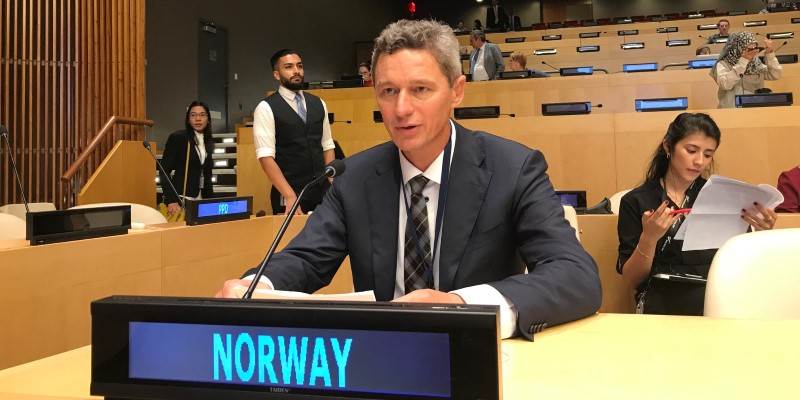President,
Thank you for updates on the draft of the strategic plan. With the adoption of the 2030 Agenda, member states made a clear call for a different way of working and collaborate to deliver on sustainable development.
Norway is a main supporter of the UN and UNDP. We believe the momentum for UN reform is now.
We need a strong, efficient and reform oriented UNDP, both in its leading role within the UN development system and as a partner in development.
We welcome the active leadership of UNDP Administrator Achim Steiner in the reform process
UNDP must adjust to the global changes, the new demands put on the UN system through the QCPR and the 2030 Agenda.
Further, UNDP must align itself with the Secretary General's reform agenda and the commitment to the ‘New Way of Working’ to strengthen the humanitarian-development nexus.
The main strength of the UNDP as a coordinating development partner is its extensive presence at country level.
The Resident Coordinator is a key at country level, we are looking forward to learn more how this role will be reflected in the Secretary General's proposals for reform.
We believe that an independent Resident Coordinator with enhanced authority is key to ensure that the UN is able to deliver on the expectations in the 2030 Agenda and in the QCPR. We therefore see the advantage of splitting the dual role of Resident Coordinator and Resident Representative of UNDP.
The strategic plan must include a clear analysis of UNDPs comparative advantage. The analysis should be used to concentrate UNDP’s thematic portfolio and contribute to a more effective division of labour and collaboration with other development actors.
Norway believes that UNDP has a comparative advantage in promotion of democratic governance and in supporting conflict prevention and state building in fragile contexts.
Service delivery by the UNDP, should in accordance with the 2030 Agenda, mainly be carried out in the least developed counties, in fragile states and in countries in the state of crises.
The UN development system must strengthen its engagement in fragile states and work better with other relevant institutions, including the World Bank.
To achieve results and ensure that “no one is left behind”, as called for in the 2030 Agenda, we welcome that UNDP is proposing gender as a goal, but underline the need to ensure a robust approach to mainstreaming of gender equality in the whole strategic plan
With regard to the principles of leaving no one behind and reaching the furthest behind first, we would like to learn how these principles will be operationalized.
We welcome UNDPs increased its engagement in prevention of violent extremism. However, UNDP should be conscious about its role, and should focus its work on issues related to conflict prevention, democratic governance and supporting state building, not necessarily labeling the efforts as “PVE”.
Funding is one crucial aspect that needs to be solved. Funding itself is a driver for change. We believe that core resources remain crucial especially for the normative functions and policy advice of UNDP. The question of funding is also related to the capacities in the Resident Coordinator office.
Norway look forward to follow the process of formulating the new plan over the next couple of months, and appreciate necessary updates must be done midterm when the Secretary General's reform agenda is known and endorsed.
Norway has supported, and will continue to support, the reform process, and the critical role played by the United Nations Development Programme.
